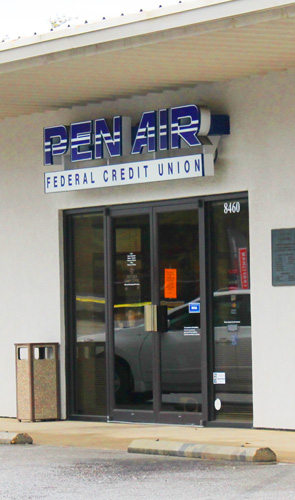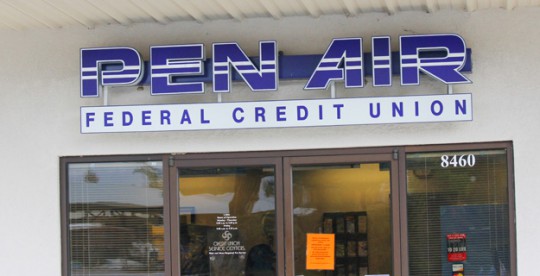Credit Unions Off Limits To Local Governments; Bill Seeks Change
March 18, 2013
There’s only one financial institution in Century, and it’s off limits to the town’s government.
Under current Florida law, public entities in the state – such as towns, cities, counties, sheriff’s and schools – can only use banks, not credit unions, for their banking needs.
As a result, Century can’t even consider using Pen Air Federal Credit Union’s branch on North Century Boulevard. Instead, all of the town’s banking business is conducted at United Bank in Flomaton — allowed because United Bank has locations in Florida.
Senate Bill 918 by Senator Rene Garcia (R-Hialeah) and House Bill 251 by Representative Bill Hager (R-Boca Raton) seek to reverse the mandate that prevents public monies from being deposited in credit unions.
 “We would like to have choice in banks,” Century Mayor Freddie McCall said. “A change would not mean we would change banks, but we would be able to shop around for the best place to bank and the best rates.”
“We would like to have choice in banks,” Century Mayor Freddie McCall said. “A change would not mean we would change banks, but we would be able to shop around for the best place to bank and the best rates.”
Stewart Ramsey, president and CEO of Pen Air, believes his credit union would be able to offer pubic entities like Century a good choice.
“Municipalities and public offices, just like area residents, should be given depository choice, especially in the more rural areas of the state where the most viable option for them is to establish lines of credit with their local credit union,” said Ramsey. “It is important that Florida lawmakers, especially those representing Northwest Florida residents, recognize the importance of this proposal this year, so that public offices can take advantage of putting their money into local, community-based institutions, whose very member-owners are the same people they seek to serve. They should be entitled to receive better rates of return on their tax dollars, which credit unions provide, and the ability to further give back to their communities.”
“The intent of this legislation is to give municipalities choices in where to deposit their funds,” said Rep. Hager. “While the intent may sound simple, the impact will be tremendous. Putting public funds into local credit unions gives municipalities and local entities the opportunity to keep their funds within their communities, and see their dollars be continuously and locally reinvested via personal or small business loans. This legislation does not give any entity preferential treatment, but rather levels the playing field for credit unions to be able to compete for funds that they should already be entitled to receive.”
Patrick La Pine, president of the League of Southeastern Credit Unions & Affiliates, said credit unions are required to meet the same public depository requirements as for-profit banks, and they are held to the same standards of accountability and offer the same protections to their members.
The Florida League of Cities has also weighed in on the issue, supporting the bill to allow governmental use of credit unions.
“Expanding public deposit authority to credit unions would greatly spur competition and lead to greater savings and higher earnings for public entities on their deposits,” said Amber Hughes, legislative advocate for the Florida League of Cities. “Municipalities and local offices are already running on stringent budgets, and any dollar saved and earned means another dollar that goes back to the community to serve a crucial purpose.”
Pictured: The Town of Century is not allowed to bank at Pen Air Federal Credit Union on North Century Boulevard, the only financial institution in the town. NorthEscambia.com photos, click to enlarge.
Comments
16 Responses to “Credit Unions Off Limits To Local Governments; Bill Seeks Change”




To Taxpayer – Ref: “Go to Penn Air’s annual report and see if you can find what Mr. Tuyo makes”.
Mr. Tuyo is no longer employed at Pen Air – been gone for awhile now.
As it stands right now all government monies must be deposited into FDIC insured financial institutions. Credit Unions are insured by NCUA. Both FDIC and NCUA are backed by the same government with the same insurability limits.
Mickey has posted Doug Broxson’s email address on his post. We should definetely email him. He hasn’t done anything for his district. He needs to listen
better because he almost lost the last election by an unknown. We should have never elected an insurance man to office.
I looked at last year and Doug Broxson voted NO on this bill! It’s amazing that our legislators love to tell us they want less government, but when it comes to actually offering less government they don’t have the fortitude to go through with it. Sure would be nice if we flooded Rep. Broxson’s phone lines with calls demanding an answer for why he voted no on this last year and tell him HIS constituents want him to vote yes!
I wouldn’t bet on Doug Broxson to vote for this bill. He has campaign contributions from commercial banks. Also he tends to follow not lead.
Good luck!
Believer, you are right! Also the credit union board is elected by the members.
Mickey I agree we need to contact our local legislators. Apparently Doug Broxson is on the committee for this bill. He needs to be contacted.
Some of these pro bank comments seem like personal attacks. Stick to the facts and they are that Credit Unions help their communities and banks are failing.
Credit Unions are the future and it may hurt some people, but buy a box of tissues and get over it.
Taxpayer, Credit Unions employee compensation is extremely competitive and in line with other Credit Unions AND banks. One thing you failed to mention is the fact that Credit Unions Board of Directors are strictly volunteer, not salaried, they do not get paid unlike the banks Board of Directors who ARE salaried. This is an extra expense the banks have to pay. Do you think the banks cut their employees salary to compensate for that extra expense? Absolutely not, banks take it from their customers. Our local agencies should be able to get the benefits of being with a Credit Union if that is what they choose to do.
I am credit union member and I will never deal with a bank again.
I hope this bill passes.
Credit Unions do not pay income taxes.
Yes, CU’s are non-profit but if they solely exist to serve their members then why not do so rather than a focus upon getting larger?
Possibly because the larger they get and more money they make the larger the compensation for officers?
They have lower rates because they have a lower cost of operation i.e. they don’t pay income tax.
Finally, Frank all the salaries of publicly traded companies are just that PUBLIC. It is called transparency. Neither Gulf Winds or Penn Air discloses the compensation of their officers. Members should have the right to know. See Gulf Wind’s report below:
http://www.gogulfwinds.com/downloads/GW-Annual-Report-2011-Sheet-web.pdf
Taxpayer get your facts straight….
You are incorrect. Credit unions do pay tangible personal property taxes, real property taxes, and as employers, credit unions pay all employment taxes just like any bank. Credit unions’ tax exemption status is due to the fact they are a not-for-profit structure. Credit unions are 100% locally-owned, and as not-for-profit financial cooperatives, they return all profits back to their members. Their clients are not customers, they are members. It doesn’t matter how much they have in a credit union they are equal. Thats why they have the lowest loan rates in the area.
We don’t need to start showing bank presidents annual salaries because
if you are a bank customer just remember this one disturbing word….BAILOUT
If CU’s wish to take public deposits then lets have them pay taxes like banks. If they are such great assets why don’t they have to pay taxes to support their community like every other business in town? If they are not a business then they must be a charity right? Charities and other public bodies must disclose compensation of exec’s. Go to Penn Air’s annual report and see if you can find what Mr. Tuyo makes: https://www.penair.org/Resources/PDFs/PenAir%20Annual%20Report%202011-web.pdf
Maybe his desire to grow the CU is not for the community’s benefit but his and the other officer’s bonuses.
This bill is needed. It will save the city and county departments money. It’s just a smart decision.
Contact your legislator to show support for this bill.
doug.broxson@myfloridahouse.gov
clay.ingram@myfloridahouse.gov
Ref. credit unions. There is a good article in the April copy of “Money” magazine about the changes that are coming about with CU’s. The fee’s are going up and a number of CU’s have done away free checking and other “perks” that use to be part of the CU selling points. The cost of using the CU’s ATM card can cause a problem due to being “out of system”. Some have had the same problems as some banks in that they have a lot of bad loans. Some have been taken over due to “failure”. The article pointed out that the larger customers get the best rates and interest also. The article is interesting and informative.
Credit unions are much better than banks for the consumer. Less fees and profits are returned to the members. The city should have this opportunity to save their citizens money. Remember banks were bailed out.
It is good to see a shift from banks to credit unions.
Good luck to our legislators in reversing this discriminatory law.
I wonder who sponsored the current exclusion law?